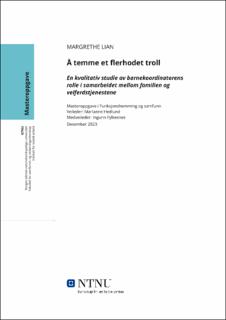| dc.contributor.advisor | Hedlund, Marianne | |
| dc.contributor.advisor | Fylkesnes, Ingunn | |
| dc.contributor.author | Margrethe Lian | |
| dc.date.accessioned | 2024-03-19T18:19:42Z | |
| dc.date.available | 2024-03-19T18:19:42Z | |
| dc.date.issued | 2023 | |
| dc.identifier | no.ntnu:inspera:156225329:21951715 | |
| dc.identifier.uri | https://hdl.handle.net/11250/3123217 | |
| dc.description.abstract | Sammendrag
Familier som har barn med store og omfattende hjelpebehov, opplever byråkratiet i samfunnet som den største utfordringen i hverdagen. Velferdssystemet oppleves som uoversiktlig, og dette går utover familielivet. Med innføring av barnekoordinator fra 1.august 2022 var hensikten blant annet at barnekoordinator skulle skape sømløse tjenester og å bistå foreldre i å manøvrere seg i velferdssystemet.
Det er gjennomført lite forskning på barnekoordinator-rollen, og med denne studien vil jeg rette søkelyset mot barnekoordinators perspektiv og erfaringer rundt rollen. Formålet er å vise hvilken betydning barnekoordinator kan ha for samarbeid med familien.
Studien har en kvalitativ tilnærming, hvor jeg har gjennomført 5 semistrukturerte intervju med hensikt å finne ut mer om barnekoordinators erfaring rundt fenomenet barnekoordinator og samarbeid med pårørende. Forskningen gjøres med utgangspunkt i et fenomenologisk perspektiv, hvor jeg er bevisst min egen forforståelse. Datagrunnlaget er analysert med utgangspunkt i refleksiv tematisk analyse. Analysen resulterte i 3 tema, med 2 og 3 subtema.
Studien viser at barnekoordinator ser det som sin hovedoppgave å finne veier inn til et samarbeid med familier og med velferdstjenester. Barnekoordinator kan være en veiviser i «jungelen» av tjenester, og med det lette litt av byrden for familiene og muliggjøre samarbeid i større grad. De kan også koordinere tjenestene som utgjør «jungelen» i familiens liv, og med det skape forutsigbarhet i samproduksjonen rundt og med familiene. Funn viser at manglende rutiner og retningslinjer for barnekoordinatorrollen, gir barnekoordinator utfordring med å tydeliggjøre sitt ansvarsområde i velferdstjenesten. Tilgjengelighet av rutiner og retningslinjer påvirker hvordan barnekoordinator skaper et tillitsbasert og forutsigbart samarbeid med pårørende.
Barnekoordinator jobber i stor grad relasjonsbasert, men mangel på rutiner og retningslinjer kan ha en indirekte påvirkning på hvordan samarbeid med familier blir gjennomført. For at barnekoordinator skal tildeles på likt grunnlag kan det være hensiktsmessig å gjøre tydelige avklaringer av barnekoordinatorrollen på kommunalt systemnivå, blant samarbeidspartnere i velferdstjenestene og med brukere av tjenesten.
Nøkkelord: Samarbeid, Velferdstjenester, Empowerment, Samskaping, Familieliv | |
| dc.description.abstract | Abstract
Families who have children with large and extensive needs for assistance experience bureaucracy in society as the greatest challenge in their everyday lives. The welfare system is perceived as complex, and this affects family life. With the introduction of a Children's Coordinator from August 1st, 2022, the intention was for the Children's Coordinator to create seamless services and to assist parents in maneuvering in the welfare system.
Little research has been conducted on the role of the Children's Coordinator, and with this study I will focus on the Children's Coordinator's perspective and experiences around the role. The purpose is to show what significance the Children's Coordinator can have for cooperation with the family.
The study has a qualitative approach, where I have conducted 5 semi-structured interviews with the aim of finding out more about the Child Coordinator's experience of the phenomenon of the Child Coordinator and cooperation with next of kin. The research is based on a phenomenological perspective, where I am conscious of my own preconceptions. The data were analyzed on the basis of reflexive thematic analysis. The analysis resulted in 3 themes, with 2 and 3 subthemes.
The study shows that the Children's Coordinator sees it as his main task to find ways into cooperation with families and with welfare services. The Children's Coordinator can be a guide in the "jungle" of services, thereby easing some of the burden on families and enabling cooperation to a greater extent. They can also coordinate the services that make up the "jungle" of the family's life, thereby creating predictability in the co-production around and with the families. Findings show that a lack of routines and guidelines for the role of Child Coordinator makes it challenging for the Children's Coordinator to clarify his or her area of responsibility in the welfare service. The availability of routines and guidelines affects how the Children's Coordinator creates trust-based and predictable cooperation with next of kin.
The Children's Coordinator works largely on a relationship-based basis, but a lack of routines and guidelines can have an indirect impact on how cooperation with families is carried out. In order for the Children's Coordinator to be assigned on an equal basis, it may be appropriate to clarify the role of the Children's Coordinator at the municipal system level, among partners in the welfare services and with users of the service.
Keywords: Collaboration, Welfare services, Empowerment, Co-creation, Family life
| |
| dc.language | nob | |
| dc.publisher | NTNU | |
| dc.title | Å temme et flerhodet troll
- En kvalitativ studie av barnekoordinatorens rolle i samarbeidet mellom familien og velferdstjenestene | |
| dc.type | Master thesis | |
